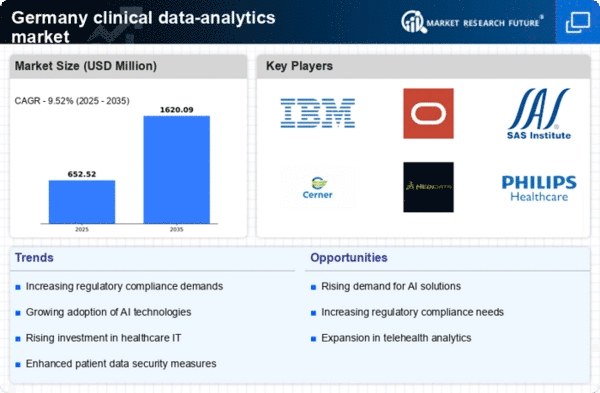Advancements in Data Interoperability
In Germany, advancements in data interoperability are significantly influencing the clinical data-analytics market. The ability to seamlessly exchange and integrate data across various healthcare systems is becoming increasingly critical. This interoperability facilitates comprehensive data analysis, enabling healthcare providers to derive actionable insights from diverse data sources. As a result, the clinical data-analytics market is likely to witness substantial growth, with estimates suggesting an increase in market value to over €1 billion by 2027. Enhanced data sharing capabilities not only streamline clinical workflows but also promote collaborative care models, ultimately leading to improved patient outcomes. The emphasis on interoperability underscores the necessity for robust data analytics solutions that can effectively harness the power of integrated health information.
Rising Demand for Personalized Medicine
The clinical data-analytics market in Germany is experiencing a notable surge in demand for personalized medicine. This trend is driven by the increasing recognition of the need for tailored treatment plans that cater to individual patient profiles. As healthcare providers seek to enhance patient outcomes, the integration of clinical data analytics becomes essential. By leveraging vast datasets, healthcare professionals can identify specific patient needs and preferences, leading to more effective treatment strategies. The market is projected to grow at a CAGR of approximately 12% over the next five years, reflecting the growing emphasis on personalized healthcare solutions. This shift not only improves patient satisfaction but also optimizes resource allocation within healthcare systems, thereby reinforcing the importance of data analytics in clinical settings.
Emphasis on Data Security and Compliance
Data security and compliance are paramount concerns within the clinical data-analytics market in Germany. With the increasing volume of sensitive patient data being processed, healthcare organizations are prioritizing robust security measures to protect against data breaches and ensure compliance with regulations such as the General Data Protection Regulation (GDPR). This heightened focus on data security is driving the demand for advanced analytics solutions that incorporate stringent security protocols. As organizations invest in secure data management practices, the clinical data-analytics market is expected to expand, with projections indicating a growth rate of around 10% annually. Ensuring data integrity and confidentiality not only fosters trust among patients but also enhances the overall effectiveness of clinical data analytics initiatives.
Integration of Wearable Health Technologies
The integration of wearable health technologies is emerging as a transformative driver for the clinical data-analytics market in Germany. As consumers increasingly adopt wearable devices for health monitoring, the volume of real-time health data generated is expanding rapidly. This influx of data presents a unique opportunity for healthcare providers to leverage analytics for proactive patient management. By analyzing data from wearables, clinicians can gain insights into patient behaviors and health trends, facilitating timely interventions. The market for wearable health technologies is projected to grow significantly, with estimates suggesting a value of €5 billion by 2028. This integration not only enhances patient engagement but also underscores the critical role of clinical data analytics in interpreting and utilizing data from diverse health sources.
Growing Investment in Health IT Infrastructure
The clinical data-analytics market in Germany is benefiting from a growing investment in health IT infrastructure. As healthcare organizations recognize the value of data-driven decision-making, they are increasingly allocating resources towards upgrading their technological capabilities. This investment encompasses the implementation of advanced analytics platforms, cloud computing solutions, and data management systems. According to recent reports, the health IT market in Germany is expected to reach €10 billion by 2026, with a significant portion directed towards analytics tools. Such investments are crucial for enhancing the efficiency and effectiveness of clinical data analytics, enabling healthcare providers to derive insights that can lead to improved patient care and operational efficiencies. The focus on health IT infrastructure is likely to propel the clinical data-analytics market forward in the coming years.
















